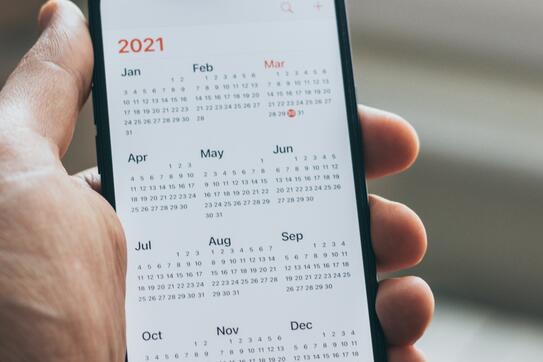NEW YORK, NY – As technology evolves and mobile devices become the center of our universe, people are transitioning to mobile calendars for convenience. However, new research from Columbia Business School may make people think twice about throwing out the paper calendar.
The research, entitled How Using a Paper Versus Mobile Calendar Influences Everyday Planning and Plan Fulfillment, is the first to directly compare consumer outcomes of mobile and paper calendar use. Columbia Business School Professor Vicki Morwitz together with Drexel University LeBow College of Business Professor Yanliu Huang and California State University Fullerton Professor Zhen Yang conducted three different experiments, finding that individuals who used paper calendars developed higher quality plans and fulfilled them at a higher success rate than their counterparts who used mobile calendars.
"Everyone uses a calendar of some sort, and with activities ramping up as pandemic restrictions are lifting, some are finding it difficult to fulfill their scheduled obligations," said Professor Vicki Morwitz, the Bruce Greenwald Professor of Business at Columbia Business School. "This might be because they are relying on digital calendars instead of paper ones. While mobile calendars might seem like the most convenient option, people who use them tend to be less effective at implementing their plans than people who use paper calendars because with paper calendars, you can see more details of your schedule at once, without having to click into an event. To develop more effective plans and increase productivity, try using an old-fashioned paper calendar."
The research team conducted three experiments to analyze the effectiveness of mobile and paper calendar use. The first study examined 129 undergraduates who were assigned randomly to paper or mobile calendars for two weeks and monitored for plan fulfilment. Paper calendar users fulfilled their plans on time at a higher rate (53%) than mobile calendar users (33%).
In the second experiment, designed to gauge the quality of plans users made on paper and mobile calendars, 450 participants who indicated that they had home improvement projects to complete in the next three weeks were randomly assigned to a paper, mobile, or mobile with a big-picture calendar and told to make detailed plans. The research team monitored the progress of those schedules and found those who used a paper calendar developed higher quality and more detailed plans, as judged by outside evaluators, than those who used a mobile calendar. However, mobile calendar users who engaged in relational thinking- seeing the big picture- developed higher quality plans than mobile calendar users who did not.
A third experiment evaluated 500 participants assigned to paper or mobile calendars as they completed a two-week plan of their choice and found that paper calendar users completed their tasks at higher rates.
Key findings include:
- Seeing the Big Picture: Paper calendars allow people to see the big picture while they’re making plans. When mobile calendar users were directed to use “big picture” views of their mobile calendar apps, they had a higher rate of plan fulfilment.
- Growing Ambition: When users relied on paper calendars, they had more detailed and cohesive plans than counterparts who used mobile calendars.
- More Likely to Follow Through: When using paper calendars, people are more likely to complete their activities. The research team attributed this to being able to see the big picture, and therefore knowing how your scheduled events will interact with or impact each other so you can plan ahead.
To learn more about the cutting-edge research being conducted at Columbia Business School, please visit www.gsb.columbia.edu.
###


